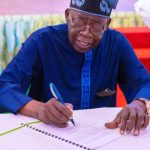Five Key Plans I Have To Restore Nigeria’s Lost Glory – Atiku

MY FELLOW NIGERIANS
Why it is necessary to offer myself again to provide the leadership Nigeria desires.
In 2019, I presented a Policy document, THE ATIKU PLAN, which sought to provide a distinct economic, political, and social development roadmap and get Nigeria working again. It envisioned economic prosperity in a united and secure Nigeria. The outcome of the 2019 elections was indeed a lost opportunity to put in place the much-needed purposeful leadership that would work to achieve the noble objectives of the Atiku Plan for Nigerians in 2019.
The failure of leadership by the APC-led government is staring every Nigerian in the face as the country’s development challenges progressively worsen and assume frightening dimensions.
As the following paragraphs illustrate, at no other time has the poverty in the quality of leadership and governance been worse than it has been since 2015.
- Nigeria’s unity has never been threatened like now. Today, an increasing number of Nigerian citizens openly challenge their allegiance to Nigeria’s corporate existence through violent agitations and misguided demands for ethno-regional autonomy because of widespread feelings
of marginalization and neglect.
- Nigeria has never been so overwhelmed by insecurity in all parts of the country. Sadly, we have reached a point where the functions of the state have been usurped by separatists, bandits,
insurgents and terrorists.
- Despite her vast resources, Nigeria has remained one of the poorest and unequal countries in the world. Our economy is fragile and vulnerable. Job losses, eroding incomes and lack of citizens’ access to
basic amenities have pushed more than 90 million people below the poverty line.
- The public education system is ill-equipped and has consistently underperformed, keeping millions of
our children out of school and producing graduates with skills and competencies which are not aligned to the needs of our communities and our industries. Incessant industrial action by the Academic Staff
Union of Universities (ASUU) and other Unions of Educational institutions has undoubtedly affected the quality of our workforce with far reaching consequences on the economy.
- Nigeria has continued to operate a faulty, complex federal structure with a high degree of centralization at the centre. The Federal Government has succeeded in accumulating many responsibilities which belong to the other [weaker] levels of government. The Federal government appropriates, along with these responsibilities, huge resources to the detriment of the states and local governments.
It has become fashionable for the APC-led government to blame the opposition and external factors for
Nigeria’s economic woes. The evidence, however, is overwhelming that the country’s under-performance is largely attributable to leadership failures in the management of the state. The APC-led government lacks the critical competencies to initiate and implement innovative solutions to our problems and deliver on their mandate with the desired impact.
Today, another opportunity is presenting itself for Nigerians to ensure the emergence of an experienced,
courageous, and result-focused leader to find a way through our country’s tough situation and make a positive difference.
I am offering myself again to provide the desired leadership. I have a history of economic reform and political transformation. As a private businessman of many years, I have a deep understanding of our economy and its challenges. As a Vice President of the Federal Republic (1999-2007), our administration demonstrated willingness to reform, and to implement a formal development agenda: the NEEDS AND SEEDS. As head of the economic management team, I was instrumental to the design of a private sector revival strategy and advocated for the opening up of the economy for private sector investments in the IT sector. Today it is undeniably the fastest growing services sector in the Nigerian economy.
I, therefore, have the pleasure to present to you, once again, my vision for a united, prosperous society in which all citizens are able to realize their full potentials in a secure and decent environment.
This document spells out our commitment to a 5-point development agenda that seeks to:
- Restore Nigeria’s unity through equity, social justice as well as co-operation and consensus amongst
our heterogenous peoples.
- Establish a strong and effective democratic government that guarantees the safety and security of
life and property.
- Build a strong, resilient, and prosperous economy that creates jobs and wealth and lifts the poor out of poverty.
- Promote a true federal system which will provide for a strong federal government to guarantee national unity while allowing the federating units to set their own priorities.
- Improve and strengthen the education system to equip its recipients with the education and skills required to be competitive in the new global order which is driven by innovation, science, and technology and to lead healthy, productive, meaningful lives’
I believe the foundation of any government is rooted in a ‘social contract.’ Government emerges and finds legitimacy in the expectation that it shall work for the common good particularly to defend man’s inalienable rights to life, property, and dignity.
The attempt to uphold and promote the social contract is manifested in the deliberate efforts to meet and give practical expression to the terms of the contract through policies and programmes in all aspects of life that will guarantee the common good for all. This Policy Document is therefore a collection of my policy commitments and responsibilities under the social contract. The proposed policies and programmes in this document are not subject to the electoral cycle; but involve short, medium, and long-term strategies.
*I summarise these as ‘My Covenant with Nigerians.’*
Atiku Abubakar GCON
(Wazirin Adamawa)









